5 Trans People of Color Open Up About Their Relationships With Their Hair
Since its inception 51 years ago, Pride Month has always been a time to celebrate the vast achievements and milestones in LGBTQIA+ history, while still serving as a moment to shine a light on social injustices within and outside of the queer community. This year, Pride Month finds itself within the midst of a global health pandemic and the international call-to-action to end police brutality and unjust murders against Black people via the Black Lives Matter movement, making its initial mission to reform society’s view on marginalized communities more essential than ever.
Which brings us to hair. Yes, hair: although it may be just hair to some, many of us know that there is much more to our hair than meets the eye. To many of us, especially to many people of color, hair is a symbol of culture and centuries of ethnic roots. For others, it’s a form of identity, allowing us to show our truest forms of self via extensions, wigs, buzz cuts, and everything in between.
And when it comes to many trans people of color, hair can be the center-point of that Venn diagram, symbolic of both culture and identity. Styles represent years of personal and physical growth, self-acceptance, and freedom of expression. In celebration of Pride, Allure spoke to five trans people on the importance of hair, and how their relationship to their own has evolved as they discovered themselves.
Dara Allen, model and stylist (she/her)
I usually wear my hair slicked back into a ballet bun, because it's low-maintenance and reliable. I've always looked to vintage fashion photographs and illustrations to find myself, and often the girls are depicted as a few lines punctuated by a dot, a little ballet bun; distinct and demure mannequin heads. When my hair is slicked back, it lets other parts of my identity — like my style or my emotions — take center stage.
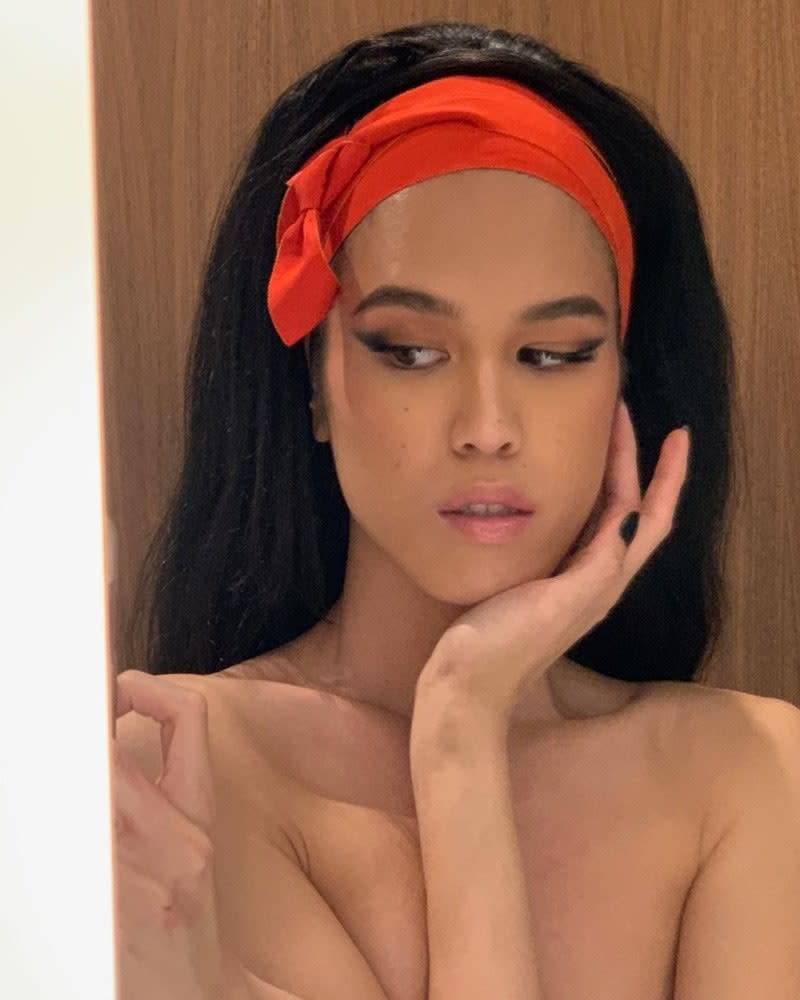
For the BIPOC Trans Community, Hair Is A Symbol of Identity and Self-Expression
Courtesy of Dara AllenAt this point, I've learned that not liking how I look is not the responsibility of my gender. Beauty is an orgasm — it can't rely on ticking boxes or meeting the ‘requirements’ of femininity, it has to go on feeling. When everything's in the right place, you just know. That's how good hair days feel. Accepting that opened up a world where I get to play instead of prove something.
While I've settled on a way I like to look if all else fails, I still can't help but experiment with my hair both at work and for play. I crave trying new things to see how they change me; it's why I really love a wig. One of my favorite pastimes is spending hours at hair shops around New York and trying on wigs with my friend Martine. It's our tradition to take each other on our birthdays. I think playing dress up and embodying different characters helps reveal who you are, and that's always been how I have come to understand and discover who I am.
Dev Seldon, artist and creative director at We Are Fluide (they/them)
Hair is so deeply connected to my identity. Growing up, the desire to have long hair or hair that was seen as feminine was something I always wanted — I remember as a child I would put a shirt on my hair and pretend that I had long flowing locks. So badly I wanted to escape the four walls of my bedroom and walk down the street looking as stunning as I knew I could be.
Now that I'm at a point in my life where I can express myself however I want, I get a lot of joy in being able to play with different wigs and hairstyles. I get to be the person I always wanted to be growing up. Because I don't really subscribe to gender as a non-binary person, hair feels so much deeper than that. It gives me the confidence to walk into any room knowing I look 100 percent how I want. It truly is a form of self-expression for me. Sometimes I won't want to wear a wig, so I'll let my hair free or I'll wear a headscarf. No look feels any less me than the other. I try my best to honor how I want to look in the moment, and that is such a beautiful thing for someone who spent so much of their life running from who they truly are.
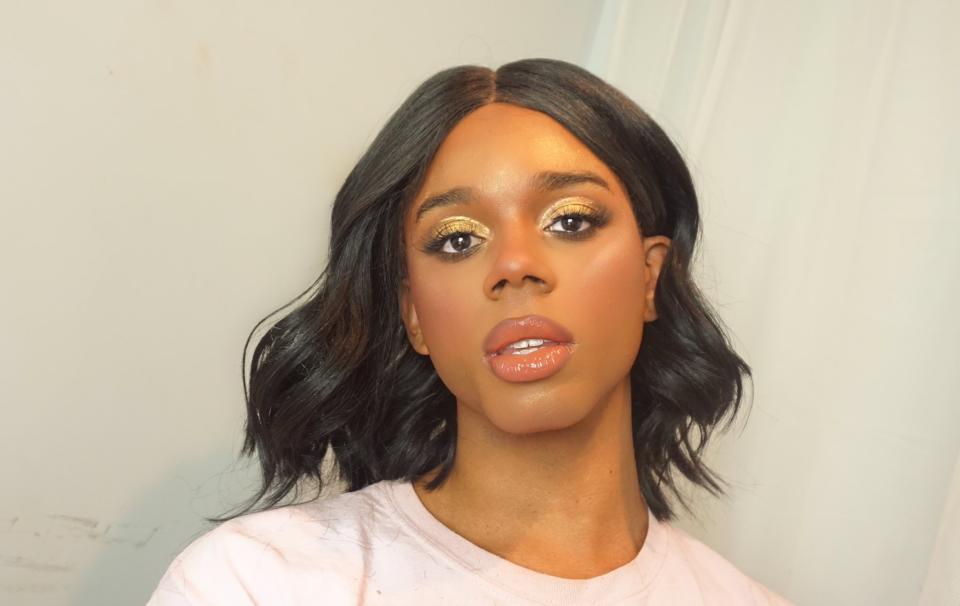
For the BIPOC Trans Community, Hair Is A Symbol of Identity and Self-Expression
Courtesy of Dev SeldonMy hair and I have a great friendship. As I've entered adulthood and gained a sense of autonomy in my body, my hair has always been a reflection of where I'm at in life. I've gone through incredibly challenging times where just being able to dye my hair or shave it off in the spur of the moment gave me the sense of control I needed at the time. It's amazing, the power that beauty and self-care holds in that way. When you spend so much of your life trying to subscribe to gender norms and status quo, you lose a sense of control in your body.
As I age, I find myself examining who I am and who I'm becoming. At first, I really just wanted to appear as feminine as possible, but I quickly learned that doesn't exactly feel right for me. I love feeling beautiful and glamorous at times, but that can present itself in so many ways because the typical loose curls down your back. I've felt gorgeous and in my body with braids, a buzzcut, a bob, and even a 40-inch lavender wig. The little child in me saw hair as fun, and I just want to keep that excitement going for the rest of my life.
Vivek Shraya, artist (she/her)
As much as I love having long hair now, I have to regularly disconnect gender and my identity as a whole from my hair. Having long hair doesn't make me more of a girl — having hair period doesn't make me more of a girl.
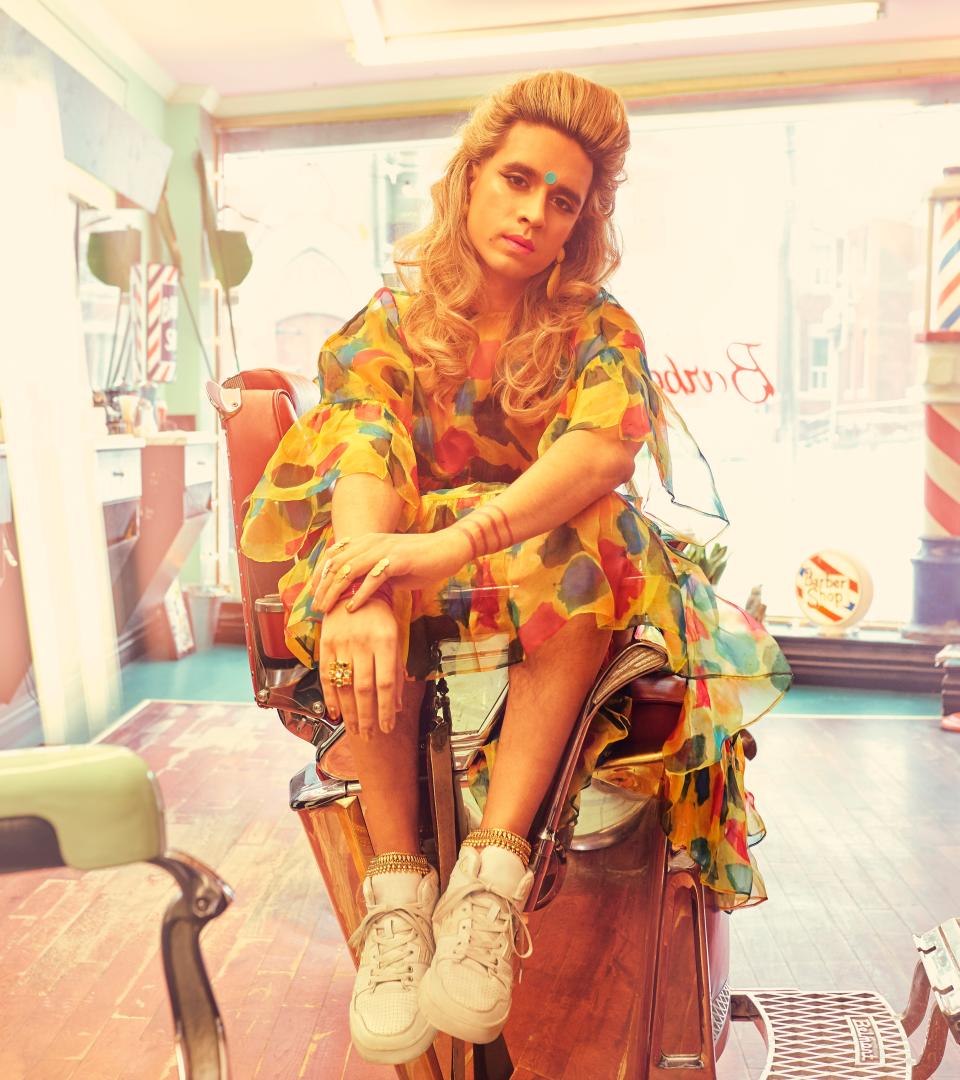
For the BIPOC Trans Community, Hair Is A Symbol of Identity and Self-Expression
Courtesy of Vivek ShrayaMy relationship to my body hair has been contentious but mostly because of the negative values placed on body hair in our culture, especially racialized body hair. That said, being a girl has given me a kind of fresh slate and forced me to recontextualize so many aspects of my appearance for myself. Being a girl has unexpectedly (and pleasantly) facilitated a love and even pride for my body hair.
A ten year anniversary edition of Vivek’s first book, “God Loves Hair,” will be published this fall by Arsenal Pulp Press.
Devin-Norelle, model, writer, and trans advocate (ze/zim/zis)
My hair is a huge part of who I am. I've never had a haircut, although it fell out from chemicals once in my teen years. I knew it would eventually grow back, but I recall being so distraught that I had lost so much of it. I think for so long I had this idea that because I'd be perceived a certain way after medically transitioning, that I'd have to let it go. This was also fueled by many friends and strangers questioning when I'd “finally” cut it. I'm glad I never did. I've discovered my hair makes me as masculine as it is feminine, which is how I feel internally about my gender as well, and that brings me a lot of comfort. My hair does not influence the way I identify my gender, but it certainly helps me express my gender's fluidity.
Because of my hair texture, I can sport several types of funky looks, whether my hair is straightened, braided, twisted out, or in an afro. Sometimes an outfit is more about my hairstyle than the clothes I'm wearing to express my gender that day. Think about how universal and genderless a ponytail can be. I sometimes wear a low ponytail for my more "masculine" looks, and a high pony for a more feminine. Hair is androgynous.
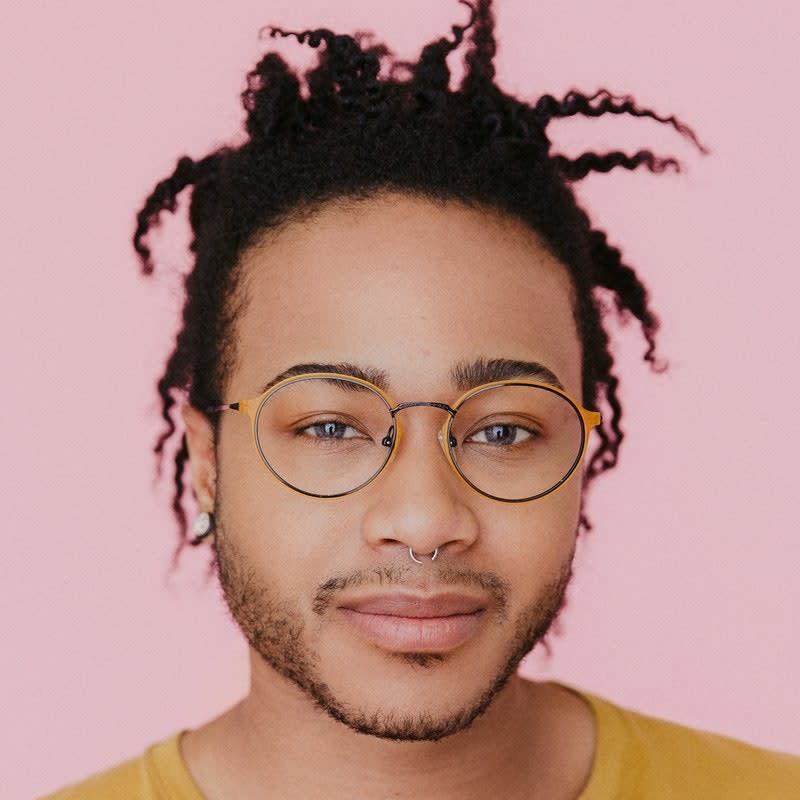
For the BIPOC Trans Community, Hair Is A Symbol of Identity and Self-Expression
Courtesy of Devin-NorelleI currently have a hate-love relationship with my hair. I'm happy that I've allowed it to grow naturally over the past five years, as it has allowed for more memorable hairstyles, but with the onset of Hormone Replacement Therapy (HRT), I've slowly begun to lose a lot of my hair, and my hairline is receding. There are some hairstyles I am no longer able to pull off. This isn't a terrible thing, however, I just have to come up with more creative ways to wear the new shorter do. The newer looks do inspire some remarkable fashion choices though, and I've certainly pushed beyond the limits with my style.
Junior Mintt (aka Junior Johnson), drag artist and activist (she/her)
My hair is one of the most integral pieces of my identity because as a Black person, my hair has been policed and devalued by society for centuries, so for me my hair is a connection to the beauty and resilience of my culture. But also as a trans woman, my hair was actually the first piece of myself that made me realize I truly connected with femininity in a way I didn’t understand. So as I began to grow out my hair and maintain my hair for the first time at 18, I began to allow myself permission to enjoy other pieces of myself I’d denied in the past.
It was the first step in my understanding of my own gender, but as an out proud Black trans woman, my hair allows me the ability to explore my gender even more, from feeling bold with Bantu knots, graceful with braids, and powerful with my afro out. I’ve been able to not only influence my identity but also my understanding of my hair because when I wear an afro it makes me feel like Angela Davis, and when I have braids I feel like Janet [Jackson].
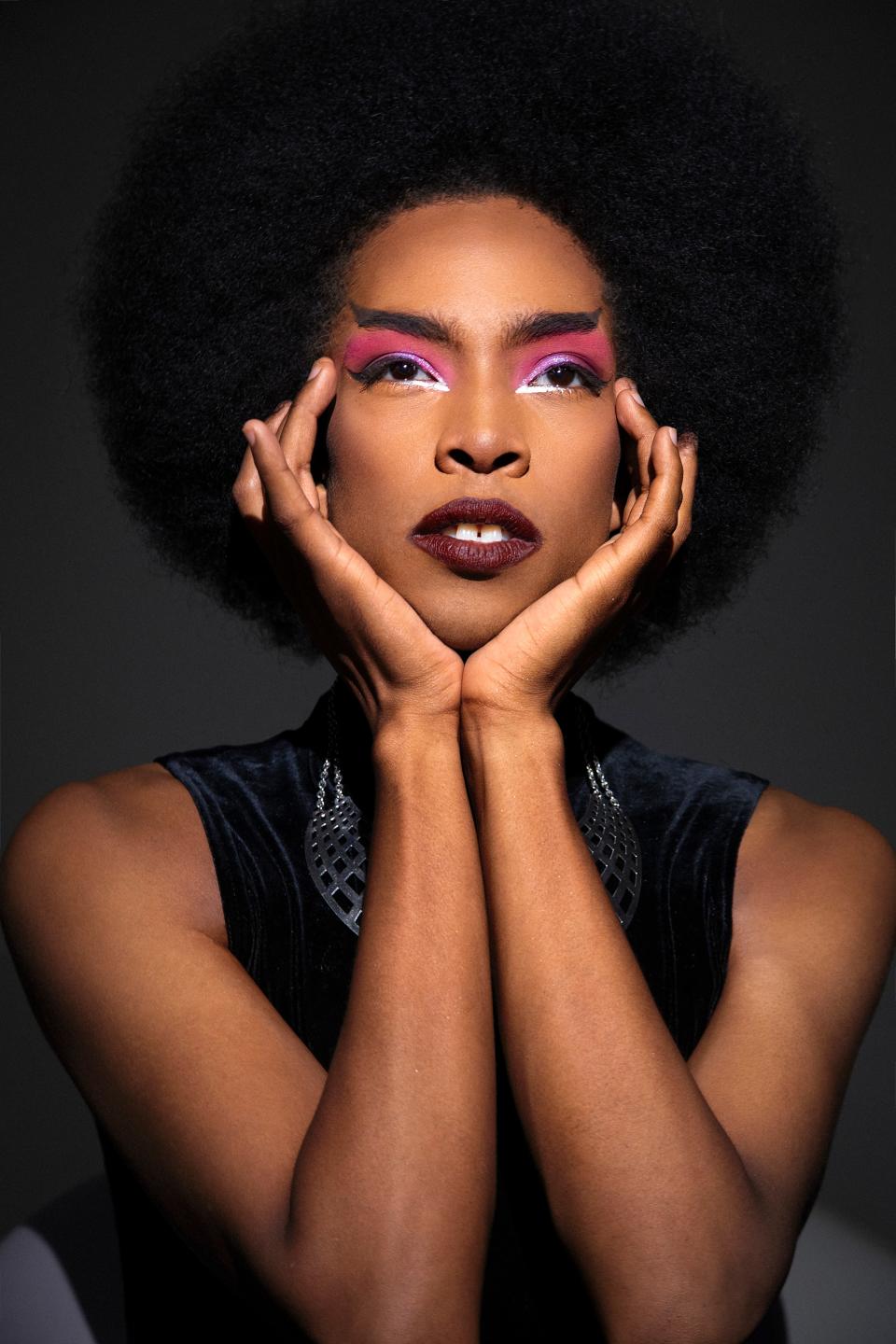
For the BIPOC Trans Community, Hair Is A Symbol of Identity and Self-Expression
Courtesy of Junior Mintt (aka Junior Johnson)You can very much track my emotional state by my hair. When I’m anxious I usually wrap it up so I don’t have to deal with it, when I’m feeling artsy I may try out a new style or add beads to braids. For me the most exciting part of hair is getting to see self-expression through it. From styles, to colors, to volume. And I’m a full time drag artist and I pride myself on not using wigs and using my own hair to exemplify the beauty and versatility of Black hair.
My relationship to my hair has only grown exponentially. My hair was always buzzed down to the scalp until I went to college. Ever since then, I have only grown more and more in love with everything about my hair; from the curl pattern, to the color, to the maintenance. But my favorite part of my relationship to my hair is the history, the lineage of Black people taking care of and maintaining hair just like mine.
Read more stories about hair on Allure:
Why I'm Still Taking Down My Twist- and Braid-Outs During Stay at Home Orders
The 19 Best Gels for Curly Hair, According to Beauty Editors and Hairstylists
Originally Appeared on Allure

